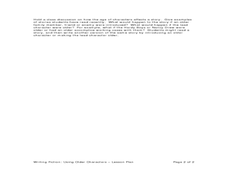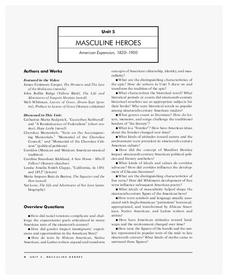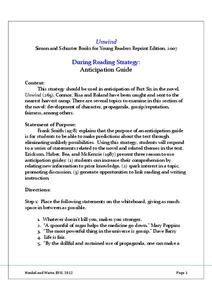Curated OER
Characterization in Literature
High schoolers discover characterization techniques and methods. In this characterization lesson, students choose favorite fiction characters and discuss what makes a character come alive. High schoolers then describe a family member or...
Curated OER
Writing Fiction: Using Older Characters
Out with the old and in with the new? Not so in this lesson plan, which explores the idea of writing older characters in fiction. Students learn the value of varying their characters, exploring different perspectives, and avoiding...
Virginia English Bulletin
Book Trailer Projects From Classroom to Community
Invite your pupils to express their understanding of a novel through a collaborative video project. Groups choose a novel from those you have studied in class, select four scenes, storyboard the scenes, film the scenes, edit the film,...
PBS
Shifting Perspectives in Toni Morrison's Beloved
An interactive provides readers with an opportunity to record their reactions to Beloved, Toni Morrison's powerful narrative based on the life of Margaret Garner. Prompts ask them to consider how the shifting point of view contributes to...
Curated OER
Fiction Stories
Students complete writing activities for fiction. In this fiction writing lesson, students complete four sets of activities in a writer's workshop format to practice reading and writing in a fiction style. Students develop plot outlines,...
Curated OER
Into the Fifties: Understanding the Context of Film Genres in the Fifties
Learners discuss prior knowledge of American culture during the 1950's. They complete KWL charts, participate in class discussions and view the documentary film Atomic Café. They record their observations from the film.
Curated OER
Creating Characters
Students examine the methods of effective characterization. In this writing skills instructional activity, students discuss how emotions, dialogue, actions, and physical descriptions build believable characters. Students then use the...
Curated OER
Character in a Box
Partners choose, research, and analyze fictional or historical characters and design character life boxes to represent them. They also compose a rhyme royal, which they understand inductively by deconstructing examples. Based largely on...
Penguin Books
Teacher’s Guide: Of Mice and Men by John Steinbeck
A 10-page guide to John Steinbeck's Of Mice and Men includes a brief plot summary, information about preparing readers for the language in the novel, pre-reading, during reading, and post-reading questions, essay prompts, and project...
Media Smarts
Media Awareness Network: Hate or Debate?
Discuss the difference between legitimate debate on a political issue and arguments that are based on hate through a science-fiction scenario that shows how a controversial issue can be discussed in both ways. Then learn how purveyors of...
Curated OER
Analyzing the Use of Irony in a Short Story
Ninth graders examine how literature connects to real-life and see how irony aids in the development of theme. They read Shirley Jackson's The Lottery, and discuss elements of foreshadowing and situational irony. Then learners will write...
Curated OER
Rudyard Kipling's "Rikki-Tikki-Tavi": Mixing Fact and Fiction
"Rikki-Tikki-Tavi," from The Jungle Book, offers young readers a chance to examine how Rudyard Kipling uses setting and personification to bring to life the brave mongoose who battles cobras to protect his family. Class members explore...
Curated OER
Identifying Science Fiction
Pupils discuss works of science fiction that they read, highlight aspects that made each a part of science fiction genre, identify formal literary elements, and discuss ways each can be developed through science fiction.
Curated OER
Evaluate Problem-Solving in the Context of Culture and Time-frame
Students examine literary elements in non-fiction literature. In this problem solving lesson, students read Rosa Parks, My Story and Beyond the Limits. Students make oral presentations based on the causes and effects, conflicts, and...
Curated OER
Introduction To Literary Analysis
Explore the fascinating ways in which authors use specific literary devices to create interesting and realistic texts. Using non-fiction articles with the subject of rogue waves, an excerpt from The Perfect Storm, by Sebastian Junger,...
PBS
The Power of Personal Narrative
Personal narratives are powerful things. Whether told from the first-person or third-person point of view, whether in the form of an essay, a short story, novel, or video, whether fiction or fact, they capture readers and give them...
Curated OER
Character Development
Round, flat, dynamic, static, and stock. Introduce viewers to the basic character types with a brief presentation that describes how to bring these characters to life. The presentation concludes with two photos. Ask your writers to...
Vanier College
Analyzing Short Stories/Novels
Good questions can help focus readers' attention on the elements writers use to add depth to their stories. The questions on this worksheet do just that and encourage readers to think critically about a story and author's purpose.
Annenberg Foundation
Masculine Heroes
What were the driving forces behind American expansion in the nineteenth century, and what were its effects? Scholars watch a video, read biographies, engage in discussion, write journals and poetry, draw, and create a multimedia...
Curated OER
Unwind: Anticipation Guide
After responding to a series of prompts on an anticipation guide, readers of Unwind craft five predictions about what will happen in Neal Shusterman's young adult science fiction novel.
National Endowment for the Humanities
Folklore in Zora Neale Hurston's Their Eyes Were Watching God
Learners define folklore, folk groups, tradition, and oral narrative. They identify traditional elements in Their Eyes Were Watching God Analyze and understand the role of traditional folkways and folk speech in the overall literary...
Curated OER
MYSPACE Profiles - Romeo and Juliet Characterization
In this Romeo and Juliet activity, students create a MySpace website as a characterization analysis for the play Romeo and Juliet. Students complete a characterization sheet for the activity.
Curated OER
Understanding Protagonists and Antagonists
How can you tell if a character is a villain? What about a hero? Work on literary analysis with an engaging language arts worksheet. After completing an activity about the four types of conflict, learners fill out a character map about a...
Curated OER
The Appliance of Science
Students delve into science fiction. In this Doctor Who lesson, students discuss the success of the British television show and then create pieces of writing and art that characterize Doctor Who. Students also visit selected websites to...

























